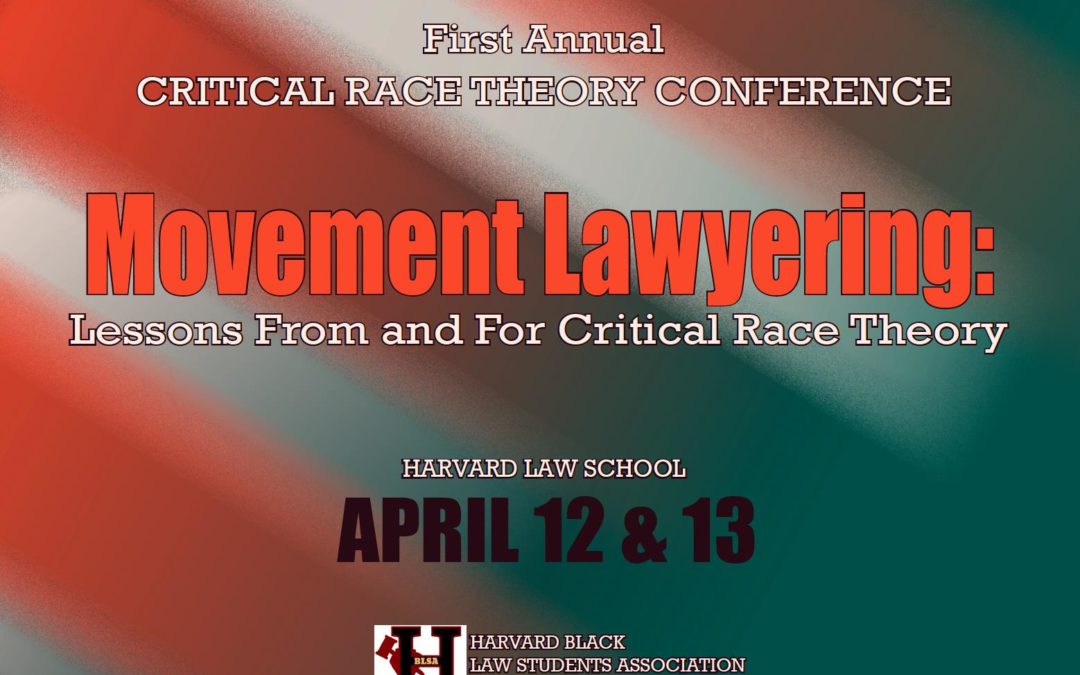1st Harvard Law School Critical Race Theory Conference
“Movement Lawyering: Lessons From and For Critical Race Theory”
Civil Rights and Civil Liberties Review & Harvard BlackLetter Law Journal
CALL FOR CONTENT
Accepting between February 11 – March 25, 2019
Post-conference reflections accepted April 13 – April 19, 2019
Derrick Bell founded Critical Race Theory (“CRT”) on the principle that it would be used to guide lawyers, scholars, activists, and communities to work together to build social movements to dismantle systems of oppression. In 1981 before Bell’s departure from HLS, a group of Harvard Law students, led by Kimberlé Crenshaw and Mari Matsuda, organized an “Alternative Course” on race and law at Harvard Law School to boycott a mini-course on race offered by HLS administration as a failed attempt to appease students demanding a discussion of race and law. The Alternative Course was in many ways the first institutionalized expression of CRT and is one of the origin stories of CRT. Since then, scholars, lawyers, and activists have utilized CRT principles to conceptualize how systems of oppression are designed to marginalize peoples at the intersection of race and their other identities, including gender, sexual orientation, immigration status, and class. Today, lawyers still grapple with how to dismantle these systems of subornation in partnership with communities, as well as the relevance of CRT in guiding that work. 37 years later, Harvard Law students are carrying forward the critical tradition sparked by the 1981 student organizers by organizing the first annual CRT Conference at HLS. The conference seeks to re-ignite this conversation by exploring how CRT today contributes to the power building efforts of modern social movements led by communities and lawyers working to dismantle systems of subordination at the intersection of race and other marginalized identities.
Today, lawyers still grapple with how to dismantle these systems of subornation in partnership with communities, as well as the relevance of CRT in guiding that work. 37 years later, Harvard Law students are carrying forward the critical tradition sparked by the 1981 student organizers by organizing the first annual CRT Conference at HLS. The conference seeks to re-ignite this conversation by exploring how CRT today contributes to the power building efforts of modern social movements led by communities and lawyers working to dismantle systems of subordination at the intersection of race and other marginalized identities.
Conference sessions include (1) CRT: Origins, Developments, and Futures; (2) The Alternative Course: Reclaiming Student Organizing, Power, and Action; (3) Models of Effective Movement Lawyering for Racial Liberation; (4) An Abolitionist #MeToo Movement: Approaches to Anti-Carceral Anti-Violence Advocacy; (5) Scaling Movement Lawyering with(out) Critical Race Theory; and, (6) Various workshops with scholars, activists, and movement lawyers.
Written Submission Requirements
- Will be published on the Harvard Civil Rights and Civil Liberties Review Amicus blog.
- Must be relevant to overall CRT Conference theme, panels, or topics in those panels.
- Organizers, activists, and people directly impacted by systems of subordination are highly encouraged to write and will receive capacity support to publish.
- Style: (1) Traditional scholarship posts analyzing a legal issue relevant to the conference theme; (2) Personal narratives that features movement lawyers/activists/directly-impacted people (day in the life) on the conference theme; (3) Reflections from organizers about social movement building techniques/challenges/successes; (4) Experiences/reflections from conference attendees; and (5) CRT summaries of works-in-progress or proposals for upcoming CRT scholarship.
- Format: Single/multi-author posts and/or interviews 500-3000 words in length with hyperlink citations (minimal footnotes).
- While there no guarantee that all submissions will be accepted, our goal is to make publishing more accessible and to democratize the production of knowledge. Editors will work closely with writers to polish submissions. All writers will be notified if their piece is accepted, not accepted, or needs more work within one week of submission.
- Please send submissions to amicusblog.crcl@gmail.com and JNunally@JD20.law.harvard.edu.

